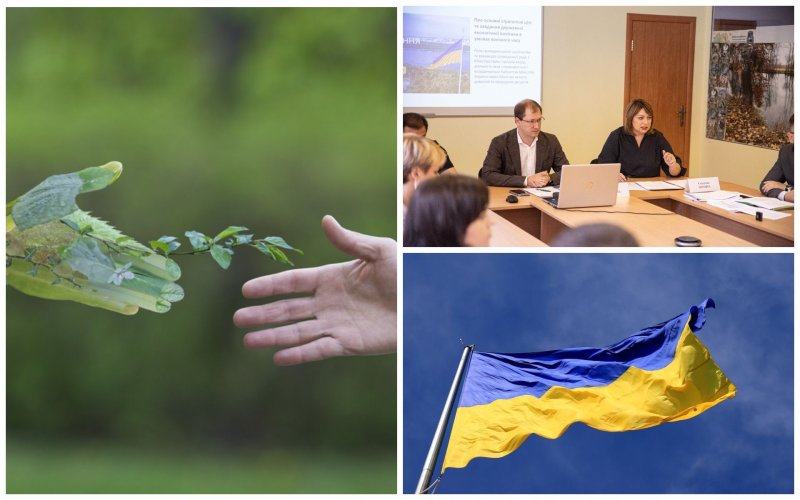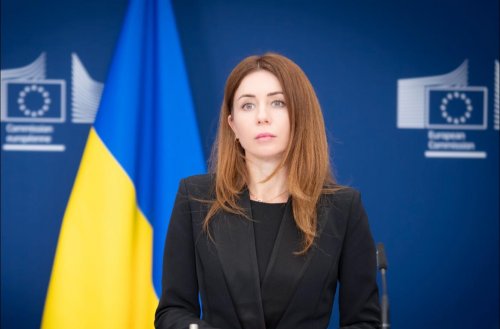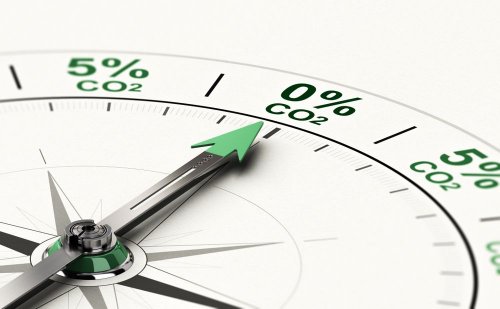EcoPolitic completes the series of materials that should sum up the environmental activities of government officials, public activists and professional ecologists during the war. So our editors analyzed what the Ministry of Environmental Protection was doing and whether eco-officials were able to stand up for the protection of nature in this difficult time for the country.
In June 2022, the ministry was going to be liquidated altogether. Since 2012, 10 people have been in the chair of the Minister of Environment Protection and Natural Resources. At the same time, none of them was delayed for more than 2 years. It is really difficult to qualitatively reform the country's environmental policy in such a short time.
The Ministry of Environmental Protection is a key body in the formation of state environmental policy. At the beginning of 2022, specialized experts expected the Ministry to work on key reforms in synergy with the Ecocommittee, as well as the implementation of already developed initiatives.
"We expect the implementation of the main principles that have already been adopted in terms of climate policy, the introduction of a system of trading quotas for greenhouse gas emissions. This will stimulate business to implement technologies that will prevent emissions or reduce them. In terms of implementing legislation, we expect monitoring and verification of greenhouse gases." Svitlana Berzina, head of the Supervisory Board under the Ministry of Environment, told EcoPolitic at the beginning of the year.
Calculation of damage to the environment from the war
On March 20, the Cabinet of Ministers adopted the Procedure for determining damage and losses caused to Ukraine as a result of the armed aggression of the Russian Federation, in particular in the areas of natural resources and infrastructure. Within a six-month period, the ministries, central and local bodies of executive power had to develop and approve the relevant methods.
On November 3, Mindovkillia approved the Methodology for determining damage and losses caused to the forest fund as a result of the armed aggression of the Russian Federation, which will also take into account lost income and damage from the destruction of animal habitats.
"This is already the fifth method developed by the ministry to determine the damage caused to the Ukrainian environment by the actions of the aggressor. There are two more on the queue - regarding the calculation of damages to the subsoil and territories and objects of the Nature Reserve Fund of Ukraine. We want the occupier to pay in full for his arbitrariness. Considering the number of crimes that the Russian Federation commits on our land every day, it will take more than a dozen years for the Russians to repay their debts to the Ukrainian people," commented the Minister of Environmental Protection and Natural Resources Ruslan Strilets.
At the beginning of November, Deputy Minister of Environmental Protection and Natural Resources Yevgeny Fedorenko stated that during the 8 months of full-scale invasion, Russia caused more than €37 billion in damage to Ukraine's environment. According to the Minister of Environmental Protection, the damage to the environment in just half a year of war reached almost 1 trillion hryvnias.
In general, judging by the number and nature of publications on the department's official website about their activities, during the 11 months of the war, the Ministry of Environmental Protection concentrated not on the adaptation of environmental policy to European standards, but on the calculation of losses from military actions.
The new team of the minister
Back in May, the Cabinet of Ministers dismissed four deputy ministers of environmental protection and natural resources at once: Mykhailo Khorev, Roman Shakhmatenko, Iryna Stavchuk, and Svitlana Grynchuk also left her post in December.
Khorev dealt with water resources issues. As he explained in a comment to EcoPolitic, that during his tenure as deputy minister, he launched 2 modern water monitoring laboratories according to European standards – in Vyshgorod and Odesa.
"In general, a lot of positive things have been done in the field of water policy of Ukraine recently. Together with international partners, we managed to conduct screenings of surface water pollutants in the Dniester, Don and Dnipro basins," he said.
Shakhmatenko was involved in the reform of environmental control — draft law No. 3091.
"It is in this area, besides the fact that we had a key law, we revised most of the methods and increased the amount of damage calculation. We completely reviewed the algorithms of activity, for example, cooperation with law enforcement agencies. In fact, it was unregulated, and all field inspections did what they wanted. That is why their activities have been regulated," he explained for our publication.
In addition, thanks to the mechanism of monitoring the work of lawyers of the State Inspectorate in courts, it was possible to increase the amount of recoveries.
Mrs. Iryna was remembered in her position for her work on the Nationally Determined Contribution to the Paris Agreement, because she was the one who lobbied for Ukraine's ambitious goals in the 2030s to reduce greenhouse gas emissions to the level of 35% compared to 1990.
Ms. Svitlana Grynchuk worked on the adaptation of environmental legislation of Ukraine to European legislation. She was responsible for the greenhouse gas emissions monitoring, reporting and verification system, as well as the emissions trading system.
Oleksandr Krasnolutskyi, Olena Kramarenko and Yevgeniy Fedorenko were appointed as the new deputy ministers of Ruslan Strilets. In response to EcoPolitic's request, we were provided with information on the topics the new deputies deal with.
Oleksandr Krasnolutskyi coordinates, directs and monitors work with: water protection and reproduction, rational use of water resources; monitoring of the natural environment; protection, protection, use and reproduction of forests; protection and rational use of land; atmospheric air protection, environmental audit; exclusion zone management. Also deals with the issue of issuing a number of environmental permits for conducting activities.
Yevgeniy Fedorenko coordinates, directs and monitors work with: policy formation in the field of geological study and rational use of subsoil; implementation of state geological control; environmental safety and management of waste, hazardous chemical substances within the defined competence; formation and implementation of policy on issues of European integration, observance and organization of the fulfillment of obligations undertaken by Ukraine under international treaties, within the competence of the Ministry of Environment; development and implementation of measures to implement the Association Agreement between Ukraine, on the one hand, and the European Union, the European Atomic Energy Community and their member states, on the other hand, and other international treaties and agreements in the field of European integration. Also, organizes the work and ensures the preparation of proposals for granting or extending the validity period of special offers permits for subsoil use.
Olena Kramarenko coordinates, directs and monitors work with: rational use, reproduction and protection of natural resources within the limits defined competence; environmental impact assessment, strategic environmental assessment; implementing technical regulation in the field of environmental protection, use of natural resources and ensuring environmental safety; carrying out in accordance with the legislation environmental impact assessment and strategic environmental assessment; handling of pesticides and agrochemicals of the state registration of plant protection products obtained with the use of genetically modified organisms. Also, organizes the work and ensures the preparation, issuance, refusal to issue, cancellation, and reissuance of documents permitting the importation of unregistered pesticides and agrochemicals into the customs territory of Ukraine.
Ministry achievements
One of the first achievements of the new ministry was creation of the Unified state environmental monitoring system. The relevant draft law was approved by the Cabinet of Ministers at the end of April.
All environmental monitoring indicators will become part of a single nationwide network. It will include information on the state of atmospheric air, surface, underground and sea waters, lands, soils, forests and biodiversity. Monitoring of waste management, geological processes and the impact of temperature, noise, vibration, radiation on people and the environment is also envisaged
"After the Parliament supports the draft law, all information on the state of environmental components will be subject to systematic monitoring at 4 levels – from national to facility level," commented Strilets during a briefing on the results of the Government meeting.
On June 20, the Verkhovna Rada adopted draft law No. 5650 "On Amendments to Certain Legislative Acts on Forest Conservation." Almost immediately, the Ministry of Environmental Protection announced that the new law would preserve forests, steppes and meadows. Strelets noted that Law No. 5650 can "increase Ukraine's forest cover by 500,000 hectares" due to the preservation of self-seeded forests.
However, the draft law was strongly criticized by ecologists of the "Ukrainian Nature Conservation Group". They explained the main nuance of the document: in order to earn, the owner of a small forest must undergo forest management, receive logging tickets, pay land tax and rent, develop a bunch of documents, provide electronic accounting of wood, and so on. They claim that it is absurd and unprofitable for a small forest. In addition, the law does not oblige anyone to legalize a self-seeded forest.
"This is still a right, not an obligation. Self-seeded forest can still be legally cleared for plowing if desired. Given the unprofitability of forestry in small forests – guess what the owners or managers will choose? If the state really intends to preserve self-seeded forests by the hands of business or local authorities, after the law 5650, we still need to work fruitfully and develop adequate rules for conducting forestry in small forests. Otherwise, 5650 will simply be a step to nowhere. No one will legalize self-seeded forests in order to receive solid losses," the UPG notes.
It is worth noting another initiative "EcoZagroza" — a web resource and mobile application created to record environmental threats on the territory of Ukraine. On "EkoZagroza", everyone can find out reliable information about the state of the environment in different regions of Ukraine, as well as inform the state about discovered facts of harming nature.
However, business representatives have criticized the application, namely in terms of the unappealable right to conduct an inspection, even on the basis of an anonymous notification of a threat.
We cannot fail to note the unpleasant nuances of the department's work. A traditional drawback of the Ministry's work is its closedness and tendency to not involve the public, experts, and regional communities in the process of decision-making and development of draft laws. Many representatives of the environmental community in Ukraine complain about difficulties in communication with representatives of the ministry. The editors of EcoPolitics also faced this.
We asked for a comment from Svitlana Berzina with a request to evaluate the work of the new team of the Ministry in 2022 from the point of view of communication with the Supervisory Board.
"We did not consider the issue of evaluating the work of the Ministry according to any rating, but I can point out that the Minister of Environment Protection and Natural Resources Ruslan Strilets and his team have made progress and understand the importance of cooperation and interaction with all interested parties on the path of reforms," said Berzina.
To sum up, in 2022, the Ministry was mainly engaged in calculating the damage to the environment from the war and digitalizing eco-services, which has no direct relation to nature conservation. On the positive side, a number of ministerial bills regulating the environmental sphere were adopted. However, a number of issues still remain open: waste reform in Ukraine, reform of industrial pollution, European integration draft laws in the environmental sphere and other urgent topics. We will closely monitor and inform our readers about what the Ministry of Environment will do in 2023.





